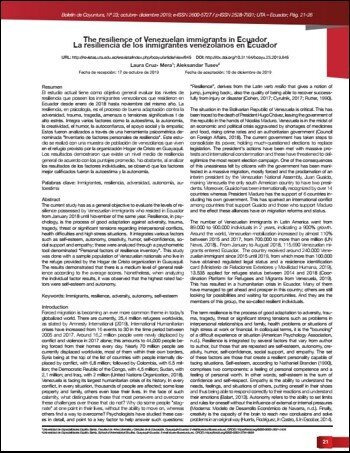The resilience of Venezuelan inmigrants in Ecuador
Main Article Content
Abstract
The current study has as a general objective to evaluate the levels of resilience possessed by Venezuelan immigrants who resided in Ecuador from January 2018 until November of the same year. Resilience, in psychology, is the process of good adaptation against adversity, trauma, tragedy, threat or significant tensions regarding interpersonal conflicts, health difficulties and high stress situations. It integrates various factors such as self-esteem, autonomy, creativity, humor, self-confidence, social support and empathy; these were analyzed through a psychometric tool denominated “Personal factors of resilience inventory”. This study was done with a sample population of Venezuelan nationals who live in the refuge provided by the Hogar de Cristo organization in Guayaquil. The results demonstrated that there is a medium level of general resilience according to the average scores. Nonetheless, when analyzing the individual factor results, it was observed that the highest rated factors were self-esteem and autonomy.
DOI: https://doi.org/10.31164/bcoyu.23.2019.845
URL: http://revistas.uta.edu.ec/erevista/index.php/bcoyu/article/view/845
Downloads
Article Details

This work is licensed under a Creative Commons Attribution-NonCommercial 4.0 International License.
![]()
The publications of the Boletín de Coyuntura are licensed under a Creative Commons Attribution-NonCommercial 4.0 International License (CC BY-NC 4.0). The Universidad Técnica de Ambato retains the copyright of the published works, and favors and allows the reuse of these, as long as: the authorship and original source of publication is cited, and they are not used for commercial or onerous purposes. The intellectual property of the published articles belongs to the authors.
References
American Society of Addiction Medicine. (2011, April 12). ASAM Definition of Addiction. Retrieved from https://www.asam.org/resources/definition-of-addiction
Amnesty International. (2019). Global facts and figures about refugees. Retrieved from https://www.amnesty.org/en/what-we-do/refugees-asylum-seekers-and-migrants/global-refugee-crisis-statistics-and-facts/
Balart, M. J. (2013). La empatía: La clave para conectar con los demás. Claves del Poder Personal, 86. Retrieved from http://www.gref.org
Branden, N. (1990). La importancia de la autoestima. en Cómo mejorar su autoestima.
Brunkswick Group. (2017). The Psychology of Resilience. The Brunswick Review, (12), 42-43. Retrieved from https://www.brunswickgroup.com/media/2876/france.pdf
Cohen, H. (2017, December 29). What is Resilience? Retrieved from https://psychcentral.com/lib/what-is-resilience/
Coordination Platform for Refugees and Migrants from Venezuela. (2019, February 1). Response for Venezuelans. Retrieved from https://r4v.info/en/situations/platform
Council on Foreign Affairs. (2018, March 23). Venezuela Is in the Midst of an Unprecedented Crisis. Retrieved from https://www.cfr.org/backgrounder/venezuela-crisis
Fletcher, D., & Sarkar, M. (2013). Psychological Resilience. European Psychologist, 18(1), 12-23. doi:10.1027/1016-9040/a000124
García, M. T., & Soria, M. (2011). Factores protectores psico socio económico que determine resiliencia en adolescentes de 11 a 19 años de colegios de la ciudad de Quito realizado durante el mes de enero 2011. Manuscrito inédito, Pontificia Universidad Católica del Ecuador, Quito, Ecuador.
Huerta, M. J., Rodri?guez, C. G., In Castro, G. A., & In Escobar, G. M. (2014). Creatividad. In Desarrollo de habilidades directivas (p. 71).
John, M. (2018). Venezuelan economic crisis: crossing Latin American and Caribbean borders. Migration and Development, 1-11. doi:10.1080/21632324.2018.1502003
Lindert, J., Carta, M. G., Schäfer, I., & Mollica, R. F. (2016). Refugees mental health—A public mental health challenge. The European Journal of Public Health, 26(3), 374-375. doi:10.1093/eurpub/ckw010
Matalinares, M., Arenas, C., Yaringaño, J., Sotelo, L., Sotelo, N., Diaz, G., … Dioses, A. (2011). Personal factors of resilience and self-concept in primary school students of Metropolitan Lima. Revista IIPSI, 14(1), 187-207.
Ministerio de Relaciones Exteriores y Movilidad Humana. (2019, February 27). Ecuador participó en debate del Consejo de Seguridad sobre Venezuela – Ministerio de Relaciones Exteriores y Movilidad Humana. Retrieved from https://www.cancilleria.gob.ec
Moderna: Modelo de Desarrollo Económico de Navarra. (n.d.). Documentación sobre las competencias. Escuelas de Familia Moderna. Retrieved from https://www.educacion.navarra.es/documents/27590/51352/AUTONOMIA_Y_RESPONSABILIDAD.pdf/34e7af0a-341e-47eb-b7a6-5b44a2c56a4e
Noticias ONU. (2018, May 9). La crisis migratoria de Venezuela, una de las mayores de los últimos años. Retrieved from https://news.un.org/es/story/2018/05/1432842
Noticiero Digital. (2018, March 19). Los venezolanos ya requieren visa para ingresar a casi toda Centroamérica - Noticiero Digital. Retrieved from http://www.noticierodigital.com/2018/03/venezolanos-visa-toda-centroamerica/
ORCID. (n.d.). ORCID. Connecting Research and Researchers. Retrieved from https://orcid.org/0000-0002-5628-2794
Organización Internacional para las Migraciones. (2018, August 14). Los términos clave de migración. Retrieved from https://www.iom.int/es/los-terminos-clave-de-migracion
Prado, R., & Del Aguila, M. (2003). Diferencia en la resiliencia según género y nivel socioeconómico en adolescentes. Manuscrito inédito, Universidad Nacional Federico Villarreal, Lima, Perú.
Quispe, V., & Vera, L. (2017). Differences in Resilience, based on Sociodemographic factors in students age 8 to 12 from marginal zones in the Cerro Colorado and Cayma Districts, Arequipa. Repositorio UNSA. Retrieved from http://repositorio.unsa.edu.pe/bitstream/handle/UNSA/3540/Psqunuv.pdf?sequence=1&isAllowed=y
Real Academia Espan?ola. (2017). Diccionario de la lengua espan?ola. Ecuador.
Rodríguez, C., & Velásquez, D. (2017). Capacidad de resiliencia adolescente en estudiantes de 12 a los 16 años. Manuscrito inédito, Universidad de Cuenca, Cuenca, Ecuador. Retrieved from http://dspace.ucuenca.edu.ec/bitstream/123456789/27282/4/Trabajo%20de%20Titulaci%C3%B3n.pdf
Salgado, A. C. (2005). Methods and instruments to measure the resilience: a Peruvian alternative. Retrieved from http://pepsic.bvsalud.org/scielo.php?script=sci_arttext&pid=S1729-48272005000100006
Schwartz, S. J., Salas-Wright, C. P., Pérez-Gómez, A., Mejía-Trujillo, J., Brown, E. C., Montero-Zamora, P., … Dickson-Gomez, J. (2018). Cultural stress and psychological symptoms in recent Venezuelan immigrants to the United States and Colombia. International Journal of Intercultural Relations, 67, 25-34. doi:10.1016/j.ijintrel.2018.09.001
Siriwardhana, C., Ali, S. S., Roberts, B., & Stewart, R. (2014). A systematic review of resilience and mental health outcomes of conflict-driven adult forced migrants. Conflict and Health, 8(1). doi:10.1186/1752-1505-8-13
Slobodin, O., & De Jong, J. T. (2014). Mental health interventions for traumatized asylum seekers and refugees: What do we know about their efficacy? International Journal of Social Psychiatry, 61(1), 17-26. doi:10.1177/0020764014535752
Tutillo, G. (2014). Capacidad de resiliencia y su relación con el desarrollo personal social en los niños de 9 a 10 años de edad. Manuscrito inédito, Universidad Central del Ecuador, Quito, Ecuador.
United Nations High Commissioner for Refugees (UNHCR). (1951). The refugee convention. Retrieved from http://www.unhcr.org
United Nations High Commissioner for Refugees. (n.d.). What is a refugee? Retrieved from http://www.unhcr.org/en-us/what-is-a-refugee.html?query=what%20is%20a%20refugee
United Nations Organization. (2018). Trends in Humanitarian Needs and Assistance. Global Humanitarian Overview 2019. Retrieved from https://reliefweb.int/sites/reliefweb.int/files/resources/Trends%20in%20Humanitarian%20Needs%20and%20Assistance%20Factsheet.pdf
Woods, D. D. (2017). Incidents – Markers of Resilience or Brittleness? In Resilience Engineering: Concepts and Precepts (p. 8). Boca Raton, FL: CRC Press.


